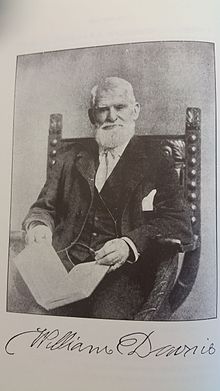 Major William Downie was born in Glasgow, Scotland and
raised in Ayrshire. In gold rush-era California,
Major Downie led an expedition up the North Fork of the
Yuba River after having arrived in San Francisco on 27
June 1849. On 5 Oct. he led a group of African American
sailors and one Irish lad eventually reaching the forks
of the North Yuba. Downie stated, "The spot where the
town stands was then the handsomest I have ever seen in
the mountains." They found gold all along the river, not
even needing a shovel to do so. Downieville, California
was adopted as the town name in a local election, and
the original name of "The Forks" was gradually dropped.
Major William Downie was born in Glasgow, Scotland and
raised in Ayrshire. In gold rush-era California,
Major Downie led an expedition up the North Fork of the
Yuba River after having arrived in San Francisco on 27
June 1849. On 5 Oct. he led a group of African American
sailors and one Irish lad eventually reaching the forks
of the North Yuba. Downie stated, "The spot where the
town stands was then the handsomest I have ever seen in
the mountains." They found gold all along the river, not
even needing a shovel to do so. Downieville, California
was adopted as the town name in a local election, and
the original name of "The Forks" was gradually dropped.Major Downie explored British Columbia at the request of Governor James Douglas. In 1858 he investigated the route from Bute Inlet to the Cariboo via the Homathko River, an attempted development of which led to the Chilcotin War a few years later. At the onset of the Big Bend Gold Rush of 1865, Downie travelled up the Columbia River before steamboat service on that route began.
Then in 1874, Downie left for Panama where he sought gold and silver by grave robbing. He then visited Alaska as he states, "for the purpose of taking a cursory glance of this wonderful country."
William Downie died on 27 Dec. 1893 on board the steamer City of Puebla just before disembarking in San Francisco from Victoria, British Columbia.
Major Downie explored British Columbia at the request of Governor James Douglas. In 1858 he investigated the route from Bute Inlet to the Cariboo via the Homathko River, an attempted development of which led to the Chilcotin War a few years later. At the onset of the Big Bend Gold Rush of 1865, Downie travelled up the Columbia River before steamboat service on that route began.
Then in 1874, Downie left for Panama where he sought gold and silver by grave robbing. He then visited Alaska as he states, "for the purpose of taking a cursory glance of this wonderful country."
William Downie died on 27 Dec. 1893 on board the steamer City of Puebla just before disembarking in San Francisco from Victoria, British Columbia.